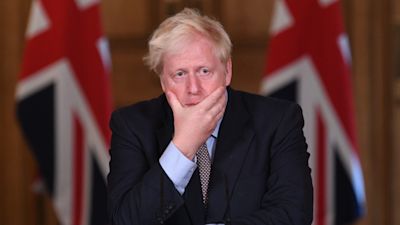Coronavirus: Six person limit could be in place for months, sparking Christmas concerns

Video report by ITV News Political Correspondent Paul Brand
Coronavirus rules restricting social gatherings in England to just six people are likely to be in place for several months, it has been announced.
England's Chief Medical Officer Chris Whitty said the new restrictions will last for a "block of time" but "putting an exact time on it is very difficult." He said people should not expect it to be a few weeks - it will certainly be longer though restrictions will be reviewed "constantly".
Despite Boris Johnson recently saying he hopes for "normality" by Christmas, the time frame of restrictions means large festive family gatherings planned for December 25 could be cancelled.
He said it's "too early to say" whether families will be allowed large gatherings at Christmas but added he is "hopeful" that some aspects of life could be "back to normal" then.
Asked by ITV News Political Editor Robert Peston if Christmas was now effectively cancelled, Mr Johnson said: "Whether we are going to get things back to normal at all by Christmas, I'm still hopeful, as I've said before, that in many ways we could be able to get some aspects of our lives back to normal by Christmas."
The new law restricting gatherings to six replaces the existing ban on gatherings of more than 30 and the current guidance on allowing two households to meet indoors.
The PM said the new simplified rules means "now you only need to remember the rule of six".
He added that "anyone breaking the rules risks being dispersed, fined, and possibly arrested".
ITV News Political Editor Robert Peston analyses the latest developments
Updating the public on the latest rule changes, the prime minister clarified a long list of exemptions which includes support bubbles, which can involve more than six people, and Covid-secure places of worship, which can house several groups so long as they are kept apart.
The new rules - which take effect from Monday - only apply in England and include everyone in the country, including young children.
“I’m sorry about that and I wish we did not have to take this step,” he added.
Mr Johnson insisted these new measures do not amount to a national lockdown, rather "the whole point of them is to avoid a second national lockdown ".
The changes have been made to combat rising coronavirus rates in England, with prevalence recently rising from 12.5 per 100,000 to around 19.7 per 100,000.
The rise is mainly taking place among younger adults, while school age children and the elderly are less affected.
The PM also said rules have been tightened for businesses such as pubs and restaurants, which will now be required by law to collect Test and Trace data from everyone in a group and retain the details for 21 days.
There will be £1,000 fine for any premises that does not comply with the rules.
Local authorities are to be supported by the government to enforce the rules at premises and will be able to rehire recently retired environmental health officers to help.
Sports pilots which have been arranged for this weekend will be allowed to go ahead, but will be limited to crowds of 1,000 and they will not take place in areas where cases are high.
Stadium pilots planned for October, such as a return for fans to Premier League football, will be reviewed in light of the rise of infection rates.
Mr Johnson also said late night restrictions forcing businesses to close from 10pm to 5am could become widespread if infection rates rise significantly in local areas - this rule is already in place in Bolton.
It will also become mandatory for anyone flying out of the country to fill in a Covid form to provide journey and contact details at the airport and border force will be checking upon people required to quarantine upon their return.
Police will also be able to shut down house parties containing more than six.
People breaching new rules on gatherings can be fined £100 however it will double for repeated offences, up to £3,200.
The prime minister said without a vaccine, a mass testing programme is the only way people will be able to lead "more normal lives".
Mr Johnson said: "In future, in the near future, we want to start using testing to identify people who are negative – who don’t have coronavirus and who are not infectious - so we can allow them to behave in a more normal way, in the knowledge they cannot infect anyone else with the virus."
Mass testing with quickly returned results could allow:
Theatres and sports venues could test all audience members on the day and let in those with a negative result, all those who are not infectious.
Workplaces could be opened up to all those who test negative that morning and allow them to behave in a way that was normal before COVID.
Those isolating because they are a contact, or quarantining after travelling abroad, could after a period be tested and released.
Watch the press conference in full: